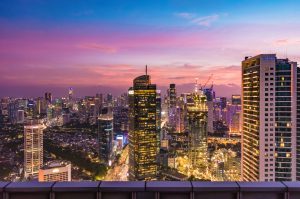With the war in Ukraine raging and continuing to disrupt global supply chains, the European Union has sought to hasten negotiations of free trade agreements (FTAs) with third-party nations. One of the largest potential partner countries also remains among the most elusive: Indonesia, Southeast Asia’s largest economy. The country of 275 million people boasts a GDP of nearly $1.2 trillion and is projected by some to be the world’s seventh-largest economy by 2030.
Since official negotiations launched in July 2016, 11 rounds of negotiations have taken place. But talks have stalled as disputes persist over the EU’s ban on palm oil and Indonesia’s ban on nickel exports. Still, Brussels should prioritize its geostrategic interests in the Indo-Pacific and accelerate an agreement by opening its single market to more sustainable palm oil products in exchange for negotiating limited nickel exports from Jakarta.
While the EU has vowed to increase its “strategic engagement” with the Indo-Pacific, the bloc’s words are currently not matched by its actions. The EU remains absent from Asia’s two largest trade agreements: the Comprehensive and Progressive Agreement for Trans-Pacific Partnership and the Regional Comprehensive Economic Partnership. Indonesia boasts the largest economy in Southeast Asia by far but ranks as just the fifth-largest trading partner of the EU in the region, behind Singapore, Vietnam, Malaysia, and Thailand.
Brussels’ economic absence from the region contrasts with the growing Chinese economic activity in Indonesia and Southeast Asia. Beijing is Jakarta’s largest trading partner with over $124 billion in bilateral trade in 2021, more than quintuple the $24 billion in EU-Indonesia trade over the same period. Announced in 2021, Brussels’s Global Gateway strategy has sought to remedy this by supporting infrastructure projects in developing countries, positioning itself as an alternative to China’s Belt and Road Initiative (BRI). But China has already supported $740 billion worth of BRI projects in Southeast Asia alone, more than double the $295 billion that the EU aims to raise by 2027 for Global Gateway projects worldwide. The “world’s regulator” cannot write the rules of the international trading system in a region where it is insufficiently present.
Moreover, in the court of public opinion, Brussels is well positioned to negotiate an FTA with Indonesia. Amid intensifying great power competition, many Indonesians trust Brussels and its intentions far more than those of Beijing or Washington. While 40 and 37 percent of Indonesians view China and the United States as a threat to Indonesia, respectively, only around 2 percent said the same about the EU.
But the EU’s palm oil restrictions have significantly hindered FTA negotiations. In 2018, the European Parliament announced plans to eliminate the use of palm oil for biofuels by 2030 due to its contributions to land clearing and deforestation. In 2019, Indonesia accused the EU of trade discrimination and filed a lawsuit at the World Trade Organization (WTO), which remains pending final adjudication. As the world’s largest palm oil producer, Indonesia views the industry that employs 16 million domestic workers as vital. The EU’s ban arguably does little more than threaten the livelihoods of thousands of Indonesian farmers and could accomplish an obverse effect: Indonesia might stop investing in green certification standards for its palm oil altogether and increase exports to alternative markets like China in order to sustain profits.
Further tensions emerged after Indonesia banned nickel ore exports in 2020. Nickel is critical for use in electric vehicle batteries and stainless steel production, the latter of which accounts for $19 billion in annual revenues and over 200,000 jobs in Europe. While Jakarta was previously the world’s largest nickel exporter, President Joko “Jokowi” Widodo has since restricted this to bolster foreign investment in domestic nickel smelters and downstream operations. As the EU’s stainless steel industry registers its lowest production levels in a decade, Indonesia looks poised to become the world’s second largest nickel producer after China. In 2021, the EU sued Indonesia at the WTO, a dispute that Jokowi has acknowledged Indonesia will probably lose. Still, he has refused to change course.
To resolve this impasse, Brussels can acknowledge Jakarta’s progress in improving the sustainability of its palm oil production and use its current ban as leverage to negotiate limited nickel ore exports. The EU should open its single market to increased imports of certified sustainable palm oil. In return, it should push Jakarta to export limited quantities of nickel ore to its 27 member states. With Indonesia likely to lose its case at the WTO, a combination of international pressure and palm oil concessions from Brussels could convince Jakarta to adjust its export ban.
To reach an EU-Indonesia FTA, Brussels should prioritize commercial needs and geostrategic interests in competing with China in the Indo-Pacific. The bloc should aim to negotiate an agreement like those it signed with Singapore and Vietnam, which more willingly loosened developmental and environmental standards to advance practical commercial interests. Indonesia should be no exception.

































